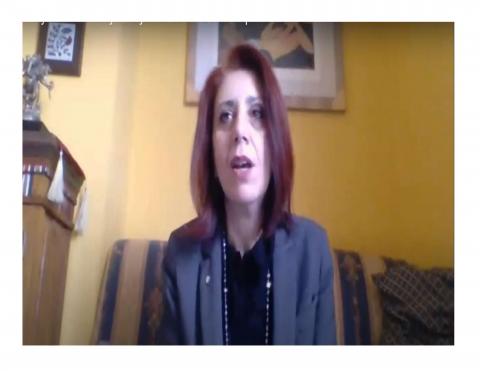Enrichment Lecture (E-Series) Mary and P.B. Shelley in Italy Prof. Elisabetta Marino

The fifth in the virtual Lecture-series, introduced by the Department of English, was held on 5 May 2020. The guest speaker was Prof. Elisabetta Marino, from the University of Rome, who spoke on the topic - Mary and P.B. Shelley in Italy.
Diverging completely from the widely-known author of the popular gothic novel Frankenstein, Prof. Marino introduced Mary Wollstonecraft Shelley to her audience as a ‘stranger’, whose love for Italy left a lasting and indelible mark on her life and the identity she built for herself both as a woman and as a writer. With her wholehearted acceptance of everything Italian, she embraced the country as the homeland of her soul, going so far as to claim her eventual return to England to be an exile from Italy.
Percy and Mary Shelley left England for Italy in March 1819 due to a delicate financial situation and Percy Shelley's deteriorating health. Prof. Marino discussed the lives they created for themselves in their new country, the intellectual circles they mingled in and the obvious interest they invested in Italy's culture and history. However, despite their varied connections and interactions with the people of Italy, the couple had clear differences in their opinions on the country. Prof. Marino outlined the literary history and contributions of P.B. Shelley in Rome, particularly the two plays, one that he wrote after being inspired by Beatrice Cenci and the other entitled Prometheus Unbound, but emphasized that he did not like the Italians very much. For him, there were two kinds of Italy - one that was laden with natural and historical richness, while the other was plagued by the immorality of its people. He wanted to go back to England when he was dying, as he felt like an exile in Italy. This was, however, contrary to Mary Shelley's experience who was compelled to go back to England purely because of economic reasons, leaving behind the rich culture, interesting people and diverse experiences that she found immersed herself in.
Prof. Marino gave several insights into the work of Mary Shelley as well. She discussed the two part-fiction, part-critical essays that Mary Shelley wrote along with her travelogue, Rumbles in Germany and Italy, an account of her travels with her son, that manifested her intimate connection with Italy. Mary Shelley's work also dealt with political aspects and situations in Italy, but with a supposed indifference. She delved into forbidden subjects through the filter of Italian art and literature, aware of her status as an outsider, but insistent of her right to speak out for what she truly believed to be her country.
Prof. Marino concluded her talk with the revelation that Mary Shelley understood and propagated in her work the fact of cultural starvation which was peculiar of Italy at that time and for which she suggested that Italians had to go back to reading. She quoted Mary Shelley's statement that motivated the Italians to overcome their problems: "The time has come when again Italians will take their place among the nations."
The highly informative lecture was followed by a Q&A session, wherein the queries of both faculty members as well as the students were answered by the speaker.

